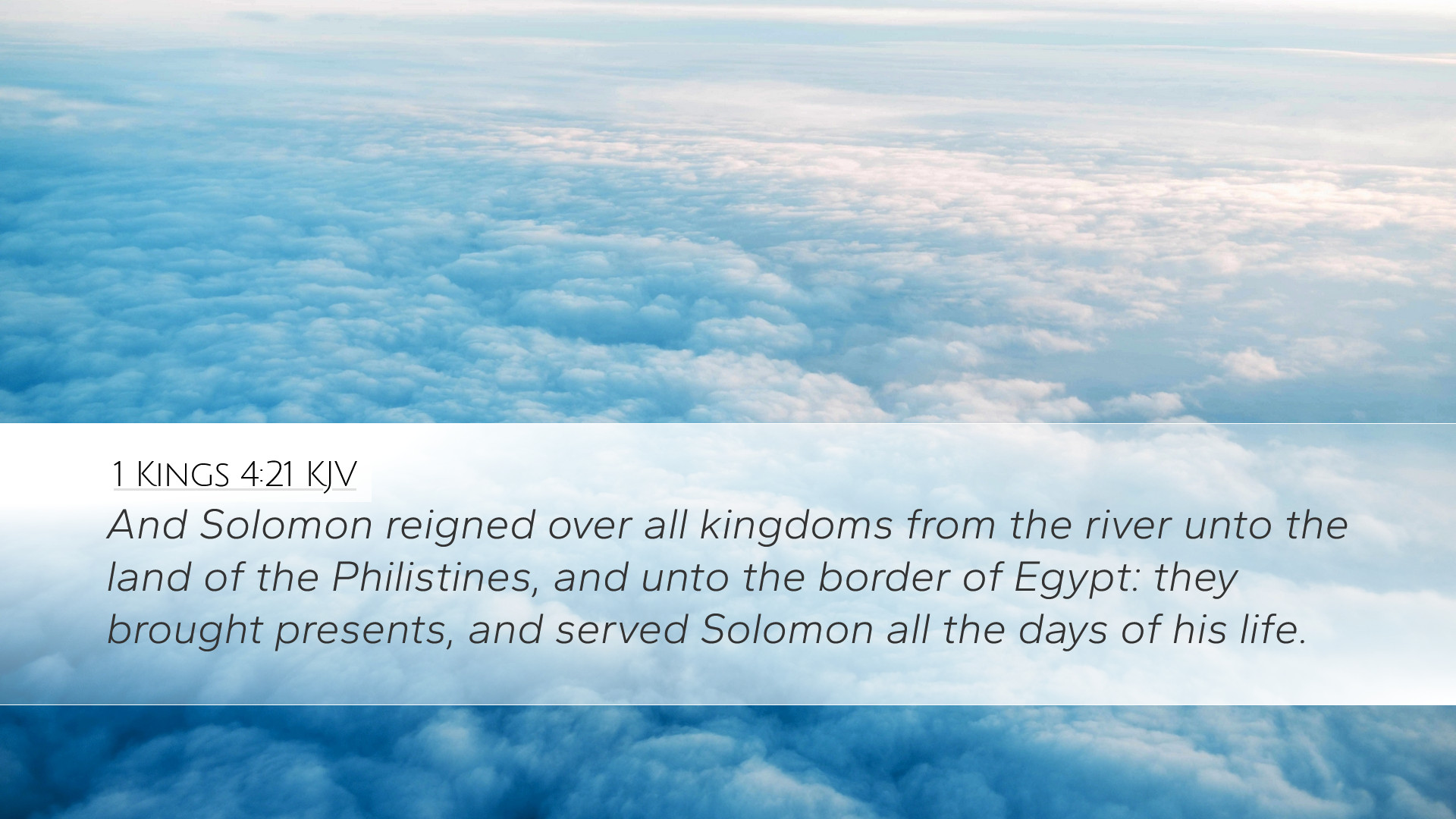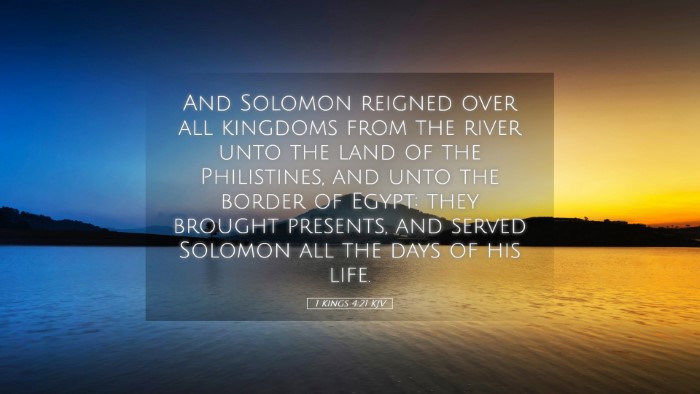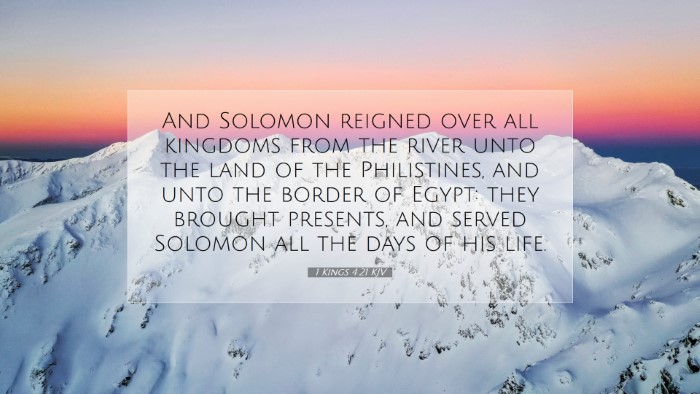Commentary on 1 Kings 4:21
Verse Reference: 1 Kings 4:21
“And Solomon ruled over all kingdoms from the River unto the land of the Philistines, and unto the border of Egypt: they brought presents, and served Solomon all the days of his life.”
Introduction
This verse provides a concise summary of Solomon’s reign and the extent of his kingdom, emphasizing not only the geographical boundaries of his rule but also the subjection of surrounding nations. The commentary herein draws from the insights of esteemed public domain scholars including Matthew Henry, Albert Barnes, and Adam Clarke, which together deepen our understanding of the significance of Solomon's kingship.
Geographical Scope of Solomon’s Rule
Matthew Henry's Insights: Henry focuses on the phrase "from the River," which likely refers to the Euphrates River, a significant marker indicating the northern boundary of Solomon's empire. He highlights that this region was historically rich and strategic, symbolizing both blessing and responsibility given by God to His chosen leader.
Albert Barnes’ Perspective: Barnes emphasizes the expansive nature of Solomon's dominion stretching “unto the land of the Philistines, and unto the border of Egypt.” He illustrates the political stability and prosperity during Solomon’s reign, noting that such a vast kingdom necessitated wisdom and diplomacy. Barnes posits that these nations were not only adjacent but often hosts of conflict, which underscores the remarkable peace Solomon achieved.
Adam Clarke’s Commentary: Clarke interprets the names of these Kingdoms as representative of God's provision and favor upon Israel. He stresses the connection between sovereignty and the divine promise made to David, and by extension, to Solomon. Clarke points out that the subjects of these kingdoms recognizing Solomon implies the fulfillment of God's covenant, showcasing the transitional royal authority that Solomon exercised.
Recognition and Tribute
The latter part of the verse states, “they brought presents, and served Solomon all the days of his life.” This phrase encapsulates the tribute and reverence that neighboring nations felt towards Solomon as a ruler.
Matthew Henry's Analysis: Henry posits that the tribute reflects not merely economic transaction but recognizes Solomon as a ruler of exceptional wisdom and charisma. His governance was one marked by a unique blend of divine blessing and human ingenuity, drawing nations to acknowledge his leadership.
Albert Barnes on Tribute: Barnes elucidates that these presents signified obedience and loyalty to Solomon, which was unprecedented for foreign powers. He notes that by serving Solomon, these nations acknowledged not just his kingship, but the God who established him. This notion reflects God’s intent for Israel to be a light to the nations, leading them toward recognition of the one true God.
Clarke’s Observations on Service: Clarke further explores the concept of service within this context, remarking that it indicates a certain level of subjection but also highlights the profound respect Solomon garnered among contemporary rulers. It also reinforces the principle that true leadership inspires loyalty and honor.
Theological Implications
This verse is significant for its theological implications regarding the sovereignty of God and human agency. It underscores the dynamics of divinely ordained leadership that exists within the framework of historical realities.
Henry's Theological Reflections: Henry contemplates the ramifications of Solomon's rule, stating that it serves to remind believers of God's ongoing provision. The extensive reach of Solomon's authority highlights God's faithfulness to His promises, and His ability to work through leaders who are aligned with His will.
Barnes’ Exploration of Divine Sovereignty: In his commentary, Barnes addresses the sovereignty of God in relation to human rulers. He warns against viewing Solomon’s achievements solely through a political lens, clarifying that all governance is ultimately under God’s providence. Solomon’s reign, with its peace and prosperity, is a portrait of God’s kingdom on earth, implying that such peace is attainable through reverence towards God.
Clarke's View on Leadership and Responsibility: Clarke emphasizes that with great power comes great responsibility. He proclaims that while Solomon enjoyed a glorious reign, the continuation of such favor depended upon his obedience to God’s laws. Thus, this passage serves as a dual reminder of God’s grace and the accountability of leadership.
Practical Applications
For pastors, students, and scholars, this verse serves as a rich text for discussion on themes of leadership, divine favor, and the dynamics of power.
- Leadership Model: Drawing lessons from Solomon’s reign provides a model for godly leadership that emphasizes wisdom, understanding, and faithfulness to God’s commands.
- Understanding God’s Sovereignty: This verse invites discourse on the nature of divine sovereignty over human history, particularly in relation to the roles of leaders in both sacred and secular domains.
- Tribute and Recognition of Authority: The significance of tribute in this context encourages reflection on how modern societies recognize leadership and the importance of honor and respect in governance.
Conclusion
1 Kings 4:21 presents a snapshot of the zenith of Solomon’s reign, emphasizing both his territorial power and the resultant tribute he received from surrounding nations. Through careful examination of this text, we see the providential hand of God at work in human leadership. For those tasked with guiding others—whether in a church, community, or scholarly environment—this verse reminds us of the underlying divine authority that governs human affairs and the profound responsibility leaders owe to their Creator. In understanding Solomon’s life, we find principles that remain pertinent today, showcasing the never-changing need for wisdom and reverence in leadership.


